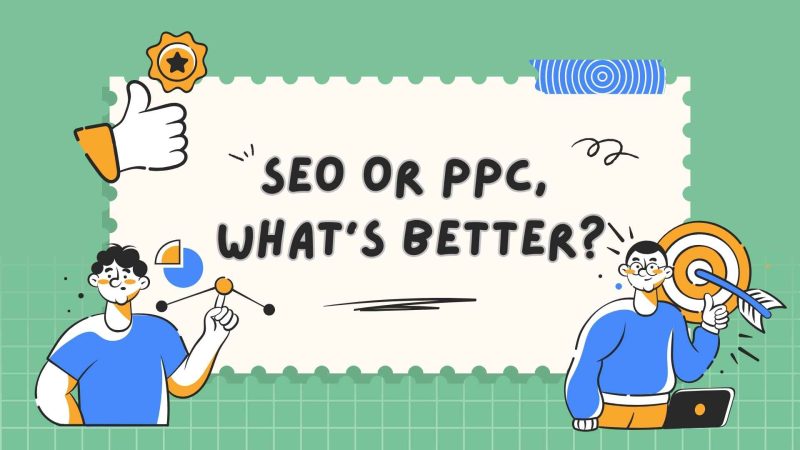SEO or PPC, what’s better?
Honestly, it depends on the business state you are in. However, via this content, we would help you to analyze the present conditions of your business and therefore take it from there.
Here we’ll explore not only the fundamentals of SEO and PPC but also their components, key differences and more.
By the end, you’ll have a clear framework to decide whether SEO, PPC, or perhaps a mix of both is the winning formula for your business goals.
What is SEO?
Let’s talk about SEO—aka Search Engine Optimization. Search engine optimization is a strategy that helps you to show up on the SERP (search engine result page) when a keyword/query related to your business, product and services is searched.
Interestingly, 64% of marketers actively invest in search engine optimization, reflecting its critical role in a comprehensive digital marketing strategy. Even more telling, 55% of marketers consider SEO either ‘very important’ or ‘extremely important’ to their overall marketing approach.
To grow & maintain organic traffic, it takes a consistent strategy & monitoring. And you should be producing content as well as improving the ones we already have. And if you have a team that can consistently do this, it can be very well done and improvised as you see results down the road.
Unlike PPC, which is more invest first approach you can start SEO for almost at $0 cost to you.
Let’s dig a little more into SEO, so that way you know what needs to be always functioned, when you have SEO campaign on for your website
Next, we’ll be exploring the core components of SEO, let’s check that out
Core Components of SEO
SEO is a combination of different techniques that make your site appear at the top of the search engine results.
Here are the big three:
On-Page SEO
This means the content that needs to be built, optimized and presented to your users. And therefore, your content should be something that covers everything related to that particular topic. Remember the old saying “Content is the King”.
Fortunately, it still works.
Every single word that you put into your blog, every picture or icon that you insert, every internal link that you add determines the amount of value Google will place on your site, and more importantly also impacts how your audience values it
Off-Page SEO
Off-page SEO focuses on your site’s or business’s reputation across the web. For any serious SEO it is all about obtaining as many quality backlinks from good authority sites as possible.
Backlinks are a way of expressing confidence and signalling to search engines that your content is worth sharing. If you want to build authority.You need to earn those links through stellar content and smart outreach. That includes ensuring your emails reach inboxes, and using an SPF record creator can help with that. (Or, if you go for spammy backlinks, enjoy the temporary boost—until Google finds out and lower those rankings)
Technical SEO
Behind every high-ranking site is technical excellence. This ranges from your website should not take long to load, should be responsive to mobile devices, and shouldn’t have any dead links or poor organization of links. Search engines reward user-friendly websites, so don’t overlook these essentials.
Key Advantages of SEO
- Cost-Effective Marketing: No ad spend, no worries. Once you have a plan for optimizing your site for the search engines you don’t have to pay for every click. The traffic that you receive is in return for your effort, not your money.
- Sustainable Traffic Growth: Unlike PPC where people stop getting to your site as soon as you exhaust your advertising budget, SEO gains pace gradually. When you are positioned at the top, you always receive natural and unique visitors to your site.
- Boosts Brand Authority: Organically being top of SERP is super hard. But when your website, Consistently appears on the first page for many keywords, it establishes your brand as an expert in your field. When people see your name repeatedly, they start associating it with trust and reliability.
Recommended Tools for SEO
A little help from the right tools can go a long way. So, roll up your sleeves and check out these tools:
Serpple:
Serpple is designed to help you fine-tune your website for optimal performance in search results. Here’s how it can support your SEO efforts:
- Keyword Rank Tracking: Monitor how your pages rank for certain keywords and watch the rank improve or not.
- Keyword Suggestions: Find out where the more higher value keywords can be ranked for visibility.
- Content Audits: With this On page SEO checker you can identify gaps or evolving issues in your content and improve your content to help it qualify with SEO.
- Competitor Tracking: See how your competitors are ranked and how you can rank ahead of them.
Search Console:
This is a free tool provided by Google to help in understanding how your website performs in search results. It gives you more than just basic metrics, letting you see more clearly what’s working and where improvement is needed.
Here’s what makes it essential:
- Performance Reports: You can see how many people are clicking on your site, what keywords they’re using and which pages get the most attention.
- Index Coverage: You can see if your site is being crawled and indexed correctly or whether anything is stopping the search engines from crawling your site.
- Mobile Usability: This feature ensures that your site is optimized for mobile, as a 2024 survey found that 63% of Google searches are made on mobile devices. Therefore, having a mobile-friendly site is crucial for better user experience and search rankings.
- Keyword Insights: You can find which keywords are generating impressions and clicks, and adjust the content accordingly.
SEO is not a race, it’s a marathon. To finish this marathon, it requires effort, patience and a tiny bit of learning. Once you get the hang of it, it’s a game changer for long term business growth. So in the next section, we’re going to investigate PPC and see how it is different. Stick around!
What is PPC?
PPC, or Pay-Per-Click is like a fast lane for digital advertising. Unlike SEO where you bring website traffic gradually, PPC is a paid strategy which involves advertisers bidding for their AD placement on SERP and paying for each click. It helps them to have quick exposure on the top of organic search listings.
It is also crucial to note that the majority of internet users are clueless between organic and paid search outputs. This ambiguity works in the favor of paid Ads, as result they have 35% greater likelihood of conversion as compared to visits from organic search sites. This statistic is evidence of the efficacy of PPC marketing for creating excellent quality leads on the spot.
You can compare it to a digital auction. Where you select your keywords, define your budget, and bid with others in your industry for the best Ad placement. The strength of PPC is that it’s fast and easy. The moment your campaign goes live, your ad starts reaching potential customers.
Core Elements Of PPC
PPC is not about just throwing money at ads and hoping to get amazing ROAS (return on AD spend). There’s a strategy behind every click:
Keyword Research and Targeting: This is what you need to get right to make the magic happen. You’ll have to find out the keywords that your target audience uses to search. For doing this, you can either use the Serpple Keyword Suggestion tool or Google Free Keyword Planner. These tools will give you data like search volume and cost per clicks (CPC) to help you get the most effective keywords for your budget and goals.
Ad Creation and A/B Testing: Creating the perfect ad copy is both art and science. Your Ad copy should be capable of grabbing attention, spark interest, and compelling action within a limited character count. You can also create a few versions of it and test the performance of each version at the time. This strategy is known as A/B testing and this can help you figure out which one resonates best with your audience.
Budget Allocation and Bidding Strategies: An effective PPC strategy is not about spending more but spending smartly. You need to set your budget and bid smart, so that you can make the most of the investment.
Key Advantages of PPC
Still thinking, should you use PPC for your business? Here are three big reasons why you should:
- Provide immediate results and visibility: Need leads now? PPC delivers. The ads start showing up to potential customers the minute your campaign goes live. It’s a great way to drive traffic during a product launch or seasonal sale.
- Precise Audience Targeting: In Google PPC campaigns, precise audience targeting is primarily managed through keyword strategies.
Advertisers can use:
- Broad Match is used for capturing a wide audience by showing ads for variations of a keyword.
- Phrase Match is used for target searches that include the meaning of a keyword.
- Exact Match is used for the highest relevance, it shows ads only for searches that match or closely resemble the keyword.
- Negative Keywords is used to exclude irrelevant traffic by preventing ads from showing on searches containing specific terms.
These keyword targeting features allow advertisers to effectively tailor their campaigns for the most relevant and potentially receptive audience and avoid unnecessary budget drain.
Flexible Budget Options: Whether you’re a small startup or a big business, PPC offers a pay-as-you-go model. This facilitates control on your spendings, and allows you to scale up or down based on your results.
Recommended Tools for PPC
Having the right tools will make or break your PPC campaign. We Have jotted down the must have PPC tools you need to use:
- Keyword Suggestion Tool by Serpple: This isn’t your average keyword generator. This tool gives you essential metrics like search volume, competition level, and CPC, so that you can easily select keywords that are both relevant and cost-effective for your PPC campaign.
- Google Ads Keyword Planner: If PPC is a race, this tool is your pit crew. This is a free tool provided by google designed for search keywords for PPC, it helps you discover new keyword opportunities, gauge competition level, and optimize your bids. The best thing about this is, it integrates seamlessly with Google Ads that makes campaign setup straightforward.
If you want quick wins and measurable results, PPC is a powerful tool for businesses. Additionally, by investing in PPC you have the ability to amplify results as owning the first ad position receives the majority of clicks.
Whether you have just started out and experimenting with a small budget or scaling up for maximum impact, PPC is profitable for everyone. As per studies Google Ads ROAS is 200% which means you get 2$ on every 1$ spent. The key lies in understanding your audience and refining your strategy with data-backed insights. Stay tuned as we explore deeper into the pros and cons of SEO and PPC in the next section!
SEO vs. PPC – Main Differences
When deciding between SEO and PPC it is like choosing between growing a tree and buying its fruit from the supermarket. Both strategies have their advantages, but the selection is determined by the target, budget, and whether prompt results are required or not. Let’s break it down.
1. Timeframe for Results
SEO: Would you be okay with the sustainable results that take time? Then be assured that SEO will give great rewards. Although, It is expensive, with the right approach over a long period it pays off. If you have just started out, you have to wait for months before it starts reaping benefits. Afterall, the investment made turns into cash flow without extra costs.
PPC: Want immediate traffic? Then Pay-Per-Click should be your go-to strategy. As soon as you click “launch” your ads will be showcased on your target keyword searches. Although it’s a rewarding approach, the problem with this is that you get no traffic when you stop paying for ads.
2. Cost Implications
SEO: Here is the bright side; you pay no fee per click. The downside? It takes effort, skills and maybe a team to execute. There are definitely initial costs associated with tools, content or an SEO consultant, but the running costs are fairly small. And also, the traffic you receive almost feels like it’s free after you’ve spent on it.
Not to mention, you can use project cost management software to track your SEO expenses, allocate budgets efficiently, and measure the return on investment over time.
PPC: It can be expensive, but it can buy you desirable advertising space. There is a price for each click, and the price can really be high in extremely competitive niches. Such an openness with PPC means that anything and everything is traceable and all ad campaigns can be modified for the best results.
3. Suitable for Business Goals
SEO: If you are looking for long term sustainability for your business and want to earn trust, then SEO is the right alternative for you. Appearing on top of organic search results frequently means that you’re a trusted source and this is ideal for businesses who want to build a strong base and stimulate repeat visits.
PPC: If your business has a seasonal sale or is launching a new product, then you need PPC. It helps you promote your business during those busy periods. You may also use it for exploratory business ventures while waiting for your organic traffic to mature.
4. Scenarios Where One Might Be Better
Startups or New Businesses with Low Visibility: PPC can help you get noticed fast. If no one knows your brand exists, paying for immediate visibility can bring your products or services in front of your target audience.
Established Businesses Seeking Sustainable Growth: If your company has already gained brand awareness and growth, investing in SEO will yield help you in the long run as Search Engine has a sweet spot for the websites that have good branded traffic. Over time, this strategy can save costs while boosting credibility.
Use SEO and PPC Together for Maximum Impact
SEO and PPC is not a war. They are better together and become a powerful marketing strategy which yields quick wins as well as sustainable growth.
By aligning both you can ensure that your brand appears both in organic results and paid ads and capture attention at multiple stages of the customer journey. This synergy approach allows you to leverage quick gains from PPC while building lasting growth with SEO.
Conclusion:
SEO vs. PPC: which is better is a never ending debate. And, honestly it varies business to business which one you should choose. For deciding which one is good for you. You should understand your business, your target audience and set a clear goal of what you want to achieve while being aware of the budget you’re able to invest in.
Then you can leverage one of them or may both strategies simultaneously to maximize your visibility, traffic and conversions.
To get started, grab a pen and paper or open your digital note and plan to lay solid foundation for a successful digital marketing strategy.
Published by
Adam White
Adam White is a 20+ year SEO professional who has optimized over 400 websites, built and sold over 20 internet and SaaS businesses all with SEO as the main traffic source. Follow him on Twitter/X
All stories by Adam White


